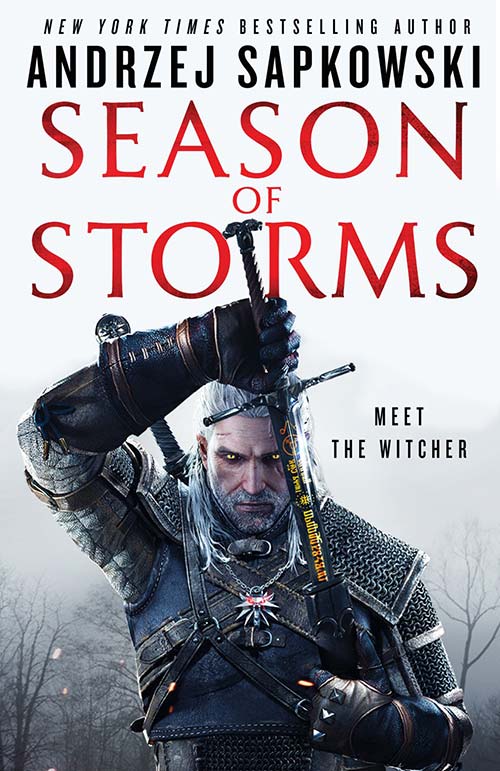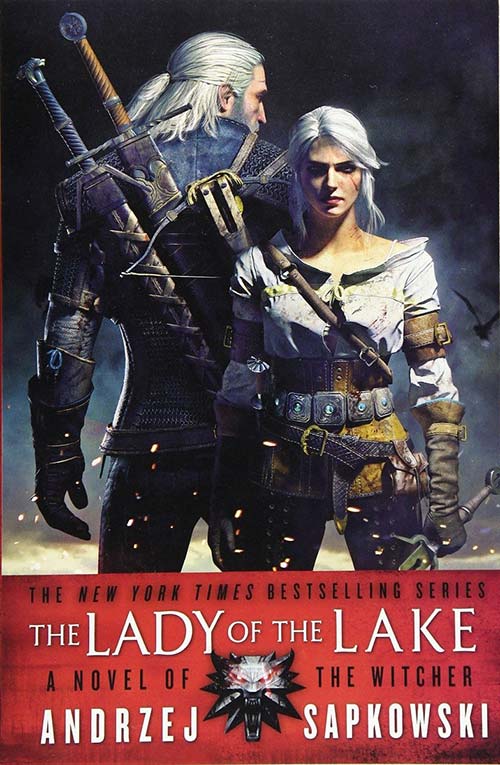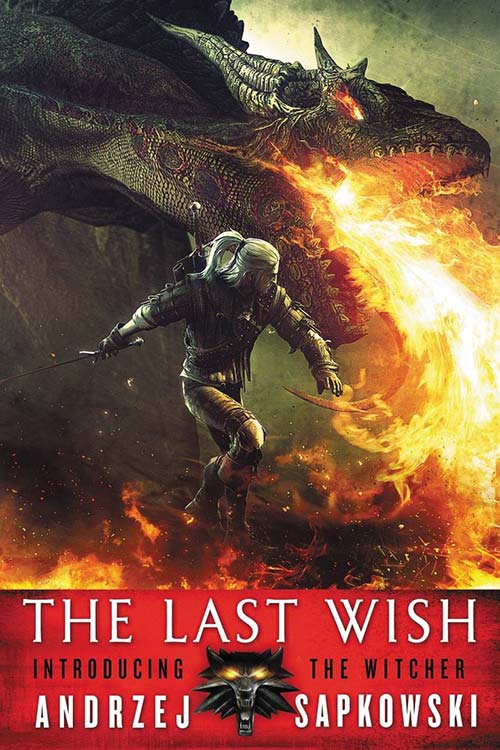Why Witcher Fans Should Read Season of Storms
Season of Storms is a pretty good read, although it doesn't move the overall Witcher story forward very much.

With seven books, three graphic novels, three video games and one ill-fated Polish TV show, fans of The Witcher have plenty of material to keep them occupied.

However, Geralt of Rivia's adventure concluded pretty definitively in the novel The Lady of the Lake — and then again, in the video-game expansion The Witcher III: Blood and Wine. How could author Andrzej Sapkowski continue the Witcher's story without pulling threads from a conclusive ending?
Enter the interquel: a work of fiction that takes place between two existing works. Season of Storms is the latest (but probably not final) Witcher novel, and takes place between The Last Wish and Sword of Destiny: the two short story collections that kicked off the whole enterprise. If you can make peace with the fact that it doesn't do much to move the overall franchise's story forward, Season of Storms is a pretty good read.

Like the books that came before it, Season of Storms is a brisk and affable fantasy yarn, full of action, character development, dry humor and philosophical musings in equal measure. Geralt of Rivia is still a thoroughly enjoyable protagonist to follow for 368 pages, and there's something reassuring about a protagonist who will — sometimes begrudgingly — do the right thing, even in a world that seems indifferent, at best, and hostile, at worst.
If you were satisfied with the ending in Lady of the Lake and are content to leave Geralt's story where it ended, there's no urgent reason to pick up Season of Storms. However, if you loved the Witcher's characters, setting and consistently clever writing style, Season of Storms is a fun and rewarding way to dive back in.
Stormy weather
If Season of Storms is your very first foray into the world of the Witcher — well, first of all, it shouldn't be, since you need to know what happened in The Last Wish to get the full story. But just in case: white-haired Geralt of Rivia is a professional monster hunter called a witcher. Using a steel sword, a silver sword, a collection of potions and a little bit of magic, Geralt hunts monsters for meager pay all across a dark fantasy world, even though people tend to distrust and shun witchers. Along the way, he tries to reconcile his feelings of isolation with the fact that he tends to pick up traveling companions and lovers on a regular basis.

Season of Storms tells a more-or-less stand-alone story from the early days of the Witcher books. After Geralt and the bedeviling sorceress Yennefer decide to go their separate ways (for the first time), the Witcher walks the Path once more. While hunting monsters and protecting caravans, scrounging up just enough money to make ends meet, Geralt encounters a deadly beast of decidedly unnatural origins.
Sign up to get the BEST of Tom's Guide direct to your inbox.
Get instant access to breaking news, the hottest reviews, great deals and helpful tips.
After meeting up with his old friend Dandelion, Geralt's investigation takes him to the seaside city of Kerack. Over the next few hundred pages, the Witcher gets thrown in prison, falls in love with a self-serving sorceress, confronts a deadly crime boss, runs afoul of a wizard cabal, escapes a territorial dispute, travels on a cursed ship and hunts a variety of monsters along the way.
The book's pacing is too brisk to get boring, and there's an awful lot more action than in, say, Blood of Elves or The Time of Contempt.
Although Season of Storms is a novel, the episodic nature of Geralt's adventures can make it feel like one of Sapkowski's earlier short story collections. This isn't a bad thing, since Geralt rarely spends more than a single chapter in the same location, or undertaking the same task. The book's pacing is too brisk to get boring, and there's an awful lot more action than in, say, Blood of Elves or The Time of Contempt.
MORE: The Best Gifts for Comic Book Lovers
As far as thematic analysis goes, Season of Storms covers well-worn ground for the series. Kings and queens are greedy and shortsighted; small towns are corrupt and suspicious; everyday folk are prejudiced and violent. At the same time, Geralt (conveniently) meets just enough helpful, intelligent and compassionate people along the way to challenge his cynicism. For every greedy city official or haughty wizard in the book, there's a kind-hearted dwarf or earnest constable. The constant push and pull between apathy and empathy will be familiar to longtime Witcher fans, but it's as satisfying in Season of Storms as in any of the previous books.
Questionable stakes
If the book has a major flaw, it's that it's limited by its place in the timeline. Geralt never discussed an adventure in Kerack in any of the previous novels. On the one hand, that's good, since it means that readers can start Season of Storms without any preconceptions about where Geralt might go, what kind of monsters he might encounter or which recurring characters might show up. The overarching narrative is full of intrigue and shifting alliances, and a few well-placed plot twists help Season of Storms feel like more than just a collection of loosely related trials and tribulations.

On the other hand, Season of Storms takes place very early on in the Witcher series. As such, we know going into it that Geralt, Dandelion, Yennefer and other major players are going to get from Page 1 to Page 368 mostly unscathed — and we know that the alluring sorceress, Coral, is not going to stick around much longer. Interesting new characters, like the dwarven miner Addario Bach, can't help but feel a bit similar to existing characters, such as Yarpen Zigrin and Zoltan Chivay. Not having access to characters from later in the chronology means that Sapkowski elected to create ersatz, one-and-done versions of them instead. There may have been a more satisfying way to handle this dilemma.
Even more so than knowing which major characters live and die, however, Season of Storms can't make a big impact in the overall series narrative. Readers already have a good idea of what transpired between The Last Wish and Sword of Destiny. Furthermore, they already know that the status quo in the Witcher novels doesn't drastically change until the end of Sword of Destiny. Geralt's adventure has huge consequences for Kerack, true — but then we never see Kerack again. If you were hoping for big revelations about the setting or story, Season of Storms doesn't have many of them.
Bottom line
Having read the other books and played the games, I found myself still craving more of Geralt's adventures, and that's exactly what Season of Storms delivers. If you want another few hundred pages of Geralt slaying monsters, gathering oddball allies, verbally sparring with powerful rulers, crossing swords with sorcerers and ultimately learning just a little bit more about himself, Season of Storms delivers exactly that.
The book is a thoroughly entertaining adventure with an unusual protagonist and a lot of variety. In that regard, it's not so different from the books that preceded it, but at this point, I don't know if Witcher fans are necessarily looking for something different. The books and games have already cemented themselves as one of the most beloved fantasy properties of the 21st century; anything at this point is going to feel like a victory lap. But if Season of Storms is indeed a victory lap, it's at least a fun, refreshing one, with plenty of great scenery along the way.
Credit: Hachett
Marshall Honorof is a senior editor for Tom's Guide, overseeing the site's coverage of gaming hardware and software. He comes from a science writing background, having studied paleomammalogy, biological anthropology, and the history of science and technology. After hours, you can find him practicing taekwondo or doing deep dives on classic sci-fi.

